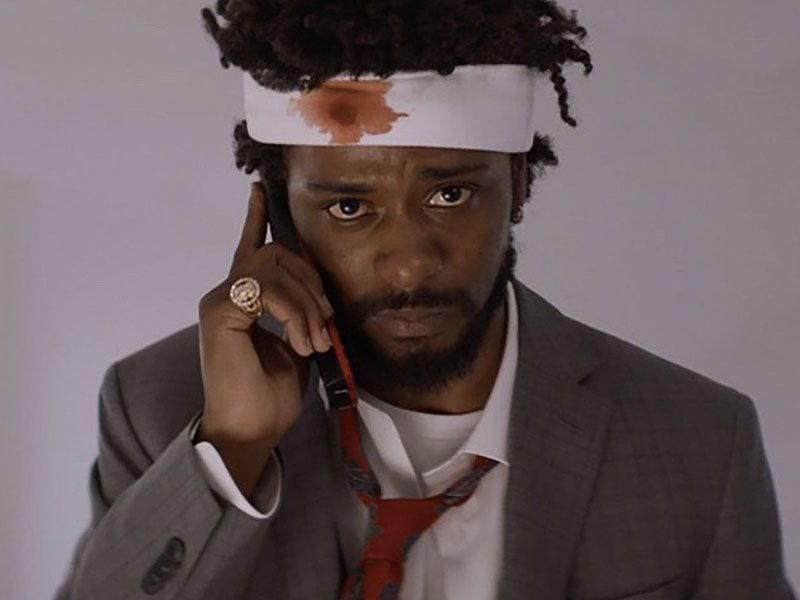Two Sundance entries, Sorry to Bother You and Blindspotting, examine racial identity in dramatically different styles. Considering that both films are based in Oakland and both are directed by first-time filmmakers, it’s nearly impossible not to compare them. Sorry to Bother You fares slightly better in this comparison, mostly because of its unbridled audacity and a more seasoned script.
Put simply, films like Sorry to Bother You are why Sundance Film Festival was created. It’s an all-out satirical assault on the senses that starts strange and ends in utter madness. Director Boots Riley takes so many chances that a viewer is left with only two options: throw your hands up in frustration or succumb to the will of the filmmaker.
Cassius ‘Cash’ Green (Lakeith Stanfield, further solidifying his status as one of our finest young actors) is a goodhearted guy who can’t catch a break. His economic inertia certainly isn’t due to lack of effort. When he interviews for a position at Regalview Telemarketing, he brings along a certificate of achievement and a gaudy sports trophy. Both are obvious forgeries, but the boss (Robert Longstreet) hires him anyway because it shows Cash “has initiative and can read”.
After a few frustrating days in the call center trying to comply with the office mantra, “Stick to the Script”, Cash gets some handy advice from a veteran telemarketer (the gloriously obscene Danny Glover): “Use your white voice.”
When Cash adopts his white persona, Sorry to Bother You begins its giddy descent into madness. You see, Cash doesn’t merely adopt a white voice; his voice is literally overdubbed by a white actor (in this case, David Cross from TV’s Mr. Show). The sales quickly pile up for Cash, and it isn’t long before he’s transferred upstairs with the other bigwigs and ‘Power Callers’.
The satire, at least initially, is confined to the periphery. Cash’s girlfriend, a ferocious performance artist named Detroit (Tessa Thompson), does her racially and sexually charged show at local galleries and acts as Cash’s moral compass. Meanwhile, a series of hilarious television commercials introduce us to a service called Worry Free Living Solutions, which promises lifetime contracts and comfortable living quarters for their slaves… er… employees.
When Cash’s economic rise finally collides with these satirical story threads in the film’s second half, the pacing accelerates to Mach speeds. You can see Riley channeling influences as diverse as Spike Lee, Mike Judge, and Michel Gondry. Though Riley is to be commended for taking so many risks, he also expends a great deal of effort to keep his story from drowning in the bombast. Several unnecessary subplots sputter into oblivion, and the film’s final confrontation is resolved a bit too conveniently.
Still, there’s no denying the power of Riley’s vision. Powerful statements are made about racial identity, as well as facilitating and profiting from slavery by more fortunate members of the victimized group. Sorry to Bother You is a film with something important to say and it says the hell out of it.
Sorry to Bother You Rating: 7
Daveed Diggs and Rafael Casal in Blindspotting (2018) (Sundance)
Blindspotting is no less ambitious with its messaging, but its delivery is much more deliberate. The film stars the intensely likable Daveed Diggs as Collin; a convicted felon with three days left on his probation. Even if Blindspotting fails to leave a mark in theaters, Diggs has earned himself a lot more work. His easy smile and penetrating gaze make you care about him immediately.
Collin’s childhood buddy and partner in crime (sometimes literally) is Miles (Rafael Casal). In many ways, Miles is the most interesting character in Blindspotting. The chip on his shoulder — the white guy in a black neighborhood who must constantly prove his toughness — could sink the Titanic. This may be Collin’s story, but Miles with his gold grill and provocative tattoos is the match dangled precariously above the spilled gasoline.
And so Collin must keep his nose clean for three more days and he’s a free man. Three days in Oakland is like a lifetime, though, especially when you’re hanging out with Miles and his concealed handgun. Making matters even worse, Collin witnesses something that not only jeopardizes his parole, but challenges the line between self-preservation and moral responsibility.
The great fallacy here, of course, is that a convicted felon can never be a free man. It’s pretty heady stuff, which makes you wish for more than just righteous indignation filtered through a squishy sitcom. In a film conceived to tackle incendiary issues like gentrification and racial identity, can you really afford five minutes of Miles trying to sell old curling irons to a belligerent beauty shop owner or a dilapidated sailboat to random passersby? To his credit, first time director Carlos López Estrada wisely gives Miles and Collin the space to fully inhabit this black community being overrun by upwardly-mobile white faces. Unfortunately, this feels like a film where everything needs to happen 15 minutes earlier than it does.
Much of the blame for this clunky plotting rests with Casal and Diggs who not only star in the film but serve as screenwriters, as well. Their inexperience shows, as the first half of the story lacks any sense of urgency, with scenes dragging too long and failing to interconnect. We enjoy spending time with these characters, but the script needs to be leaner and less self-indulgent.
When things finally click into gear, however, Blindspotting is relentless. Racially-charged arguments between Miles and Collin provide some of the most honest dialogue you’re likely to hear on the subject. It also features a gut-churning conclusion that will have audiences yelling at the screen.
Just what exactly you yell at the screen will largely depend upon your background. Collin’s actions are either completely justified or socially irresponsible. This is the power of Blindspotting; despite its many flaws, it dares you to reconsider even the most strongly held beliefs.
Blindspotting Rating: 6



![Call for Papers: All Things Reconsidered [MUSIC] May-August 2024](https://www.popmatters.com/wp-content/uploads/2024/04/all-things-reconsidered-call-music-may-2024-720x380.jpg)



